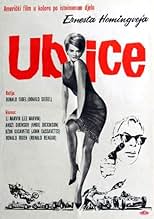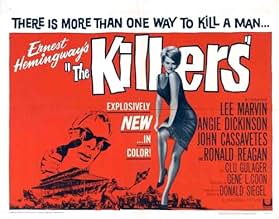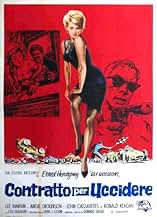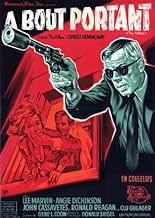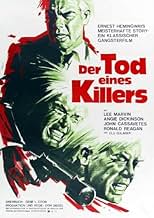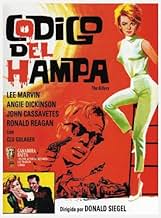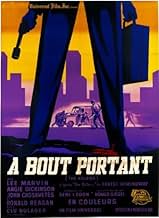Surprised that their contract victim didn't try to run away from them, two professional hit men try to find out who hired them and why.Surprised that their contract victim didn't try to run away from them, two professional hit men try to find out who hired them and why.Surprised that their contract victim didn't try to run away from them, two professional hit men try to find out who hired them and why.
- Won 1 BAFTA Award
- 1 win & 1 nomination total
Irvin Mosley Jr.
- Mail Truck Guard
- (as Irvin Mosley)
- Director
- Writers
- All cast & crew
- Production, box office & more at IMDbPro
Featured reviews
Don Siegel's 'The Killers' is a diamond in the rough! Initially filmed for television, its technical limitations are easily overlooked as they are more than compensated for by the drive of the no-nonsense narrative, and the high standards of the acting. Caught somewhere between Kubrick's 'The Killing' and Boorman's 'Point Blank', it may not be as flamboyantly impressive as either, but it is just as memorable in its own low key way.
Quentin Tarantino has admitted that the structure of 'The Killing' has influenced him, but after watching 'The Killers', one must question whether this movie is also high on his list. Especially as the cooler-than-thou hit-men played by Lee Marvin and Clu Gulager almost anticipate Travolta and Jackson's similarly quirky ones in 'Pulp Fiction' thirty years later. Just like Vincent and Jules, Charlie and Lee are eccentric and likable when "off duty" and brutal sociopaths when on. Lee Marvin is one of Hollywood's legendary screen tough guys, and his performance here is as good as any he ever did, but the real stand out for me is Clu Gulager's health nut contract killer. He just about steals every scene he is in. Up to this point he was mainly known as a Western TV star. Why this role didn't launch him into a Bruce Dern/Harry Dean Stanton/Dick Miller style career baffles me. Instead he was mainly consigned to the "made for TV" wasteland, and never got the breaks his talent deserved.
Marvin and Gulager's star turns are backed up by strong supporting performances from John Cassavetes, as their enigmatic "job", Angie Dickinson, a double-crossing femme fatale, and Ronald Reagan in a surprising turn as a nasty gangster. Also keep an eye out for a dialogue-free cameo by a very young looking Seymour Cassel!
'The Killers' looks better and better as the years go by. Not without flaws, sure, and calling it a masterpiece would be overkill, but it's a movie that was ahead of it's time in many ways, and it can't help but impress discerning fans of 50s/60s b-grade crime movies, film noir, or Sam Fuller.
Quentin Tarantino has admitted that the structure of 'The Killing' has influenced him, but after watching 'The Killers', one must question whether this movie is also high on his list. Especially as the cooler-than-thou hit-men played by Lee Marvin and Clu Gulager almost anticipate Travolta and Jackson's similarly quirky ones in 'Pulp Fiction' thirty years later. Just like Vincent and Jules, Charlie and Lee are eccentric and likable when "off duty" and brutal sociopaths when on. Lee Marvin is one of Hollywood's legendary screen tough guys, and his performance here is as good as any he ever did, but the real stand out for me is Clu Gulager's health nut contract killer. He just about steals every scene he is in. Up to this point he was mainly known as a Western TV star. Why this role didn't launch him into a Bruce Dern/Harry Dean Stanton/Dick Miller style career baffles me. Instead he was mainly consigned to the "made for TV" wasteland, and never got the breaks his talent deserved.
Marvin and Gulager's star turns are backed up by strong supporting performances from John Cassavetes, as their enigmatic "job", Angie Dickinson, a double-crossing femme fatale, and Ronald Reagan in a surprising turn as a nasty gangster. Also keep an eye out for a dialogue-free cameo by a very young looking Seymour Cassel!
'The Killers' looks better and better as the years go by. Not without flaws, sure, and calling it a masterpiece would be overkill, but it's a movie that was ahead of it's time in many ways, and it can't help but impress discerning fans of 50s/60s b-grade crime movies, film noir, or Sam Fuller.
Director Don Siegel's "The Killers" is very loosely based on the Hemingway short story with few similarities. Two killers (Lee Marvin and Clu Gulager)complete an easy hit-for-hire but wonder why their victim, although warned in advance, didn't run away from them. After piecing together some information, they realize that the $25,000 they got for the hit is a drop in the bucket compared to a missing million dollar stash of stolen loot. After questioning a few "witnesses" they discover that the man they killed had been double-crossed and had lost his will to live. Throw in Angie Dickinson as a two-timing temptress and Ronald Reagan (of all people) as a nasty double-dealing henchman and you've got one violent movie without any good guys in sight. Marvin and Gulager are excellent as the hit men and John Cassavettes is also great as their hapless and resigned victim. Reagan, who supposedly regretted his turn here as a villian, is surprising effective. It was the only time in his career he played a "bad guy". Angie Dickinson, of course, is no mere window-dressing. She gives everyone a run for their money as the best-looking devious dame on the planet. "The Killers", which was originally made for TV, but released in theatres instead due to its violent subject matter, is a one-of-a-kind early 60's film noir. It may have little to do with Hemingway's story, but I'm sure "Papa" would have enjoyed it anyway.
One of Hollywood's greater contract directors, Donald Siegel, brought Hemmingway's short story to TV, but NBC turned it down because, for 1964, it was too damn brutal. Although it pales in comparison to the 1946 original, this cheap (thanks to the gawd-awful production values of Universal in the sixties) remake holds it own.
When button-men Lee Marvin and Clu Gulager show up at a school for the blind to empty their silenced revolvers into former race-car driver John Cassavetes, they don't expect him to just stand there and take it. Marvin, exuding clean-smelling and lean menace and Gulager, a carrot-juice swilling sociopath travel cross-country in their search for Cassavetes' story. They find that the race driver, washed up after a near-fatal crash gains employment with mobster Ronald Reagan (I can just see Ronnie giving Gorbachev the same look at the 1986 summit that he gives Cassavetes when the driver challenges the mobster for control of Reagan's girl, Angie Dickinson). After lots of double-crosses and a fair amount of "why did he or she do that?," Marvin comes calling at Reagan's door.
Lee Marvin was excellent when portraying a killing machine and he holds the movie together. He and Gulager are there to punctuate the sometimes good and sometimes not-so-good flashbacks and they are suave and eerily debonair grim reapers. If anything, they're more interesting than the flashbacks; all good action flicks need good bad guys and Reagan looks too bored with the whole thing. Is it possible that, after seeing him so successful and upbeat for eight years in the White House, a grim and petty Reagan seems anachronistic? Yet, it really is Marvin who makes this movie rise above the cheap production values, the cheesy matte photography, and the canned John(ny) Williams score.
Marvin was about to begin a string of successes that would last into the early seventies. That voice is so distinctive! When he talked, he sounded, as another reviewer once said, "like a dinosaur growling." He is so evil and you can't stop liking him. Although Marvin and Robert DeNiro are completely different actors, they both have the same effect on me when they inhabit the screen--I stop doing everything else and just watch them. Pure charisma. When asked by David Letterman why he was so popular, Lee Marvin simply grinned and, with his index finger extended, growled, "Ratatatat!" Don Siegel would go on to make other tough movies; his style was clean, tough, and with just enough style to leave the audience with a satisfied taste in it's mouth. Under his direction, Clint Eastwood would establish himself as a superstar. One can only imagine how far Marvin would have gotten under the command of the button-man director!
When button-men Lee Marvin and Clu Gulager show up at a school for the blind to empty their silenced revolvers into former race-car driver John Cassavetes, they don't expect him to just stand there and take it. Marvin, exuding clean-smelling and lean menace and Gulager, a carrot-juice swilling sociopath travel cross-country in their search for Cassavetes' story. They find that the race driver, washed up after a near-fatal crash gains employment with mobster Ronald Reagan (I can just see Ronnie giving Gorbachev the same look at the 1986 summit that he gives Cassavetes when the driver challenges the mobster for control of Reagan's girl, Angie Dickinson). After lots of double-crosses and a fair amount of "why did he or she do that?," Marvin comes calling at Reagan's door.
Lee Marvin was excellent when portraying a killing machine and he holds the movie together. He and Gulager are there to punctuate the sometimes good and sometimes not-so-good flashbacks and they are suave and eerily debonair grim reapers. If anything, they're more interesting than the flashbacks; all good action flicks need good bad guys and Reagan looks too bored with the whole thing. Is it possible that, after seeing him so successful and upbeat for eight years in the White House, a grim and petty Reagan seems anachronistic? Yet, it really is Marvin who makes this movie rise above the cheap production values, the cheesy matte photography, and the canned John(ny) Williams score.
Marvin was about to begin a string of successes that would last into the early seventies. That voice is so distinctive! When he talked, he sounded, as another reviewer once said, "like a dinosaur growling." He is so evil and you can't stop liking him. Although Marvin and Robert DeNiro are completely different actors, they both have the same effect on me when they inhabit the screen--I stop doing everything else and just watch them. Pure charisma. When asked by David Letterman why he was so popular, Lee Marvin simply grinned and, with his index finger extended, growled, "Ratatatat!" Don Siegel would go on to make other tough movies; his style was clean, tough, and with just enough style to leave the audience with a satisfied taste in it's mouth. Under his direction, Clint Eastwood would establish himself as a superstar. One can only imagine how far Marvin would have gotten under the command of the button-man director!
When two hitmen kill Johnny North, it sticks with them why he simply stood ready to die and didn't bother trying to run or fight them. They look into his past and find he was once a successful driver of racing cars until an accident left him unable to compete in the big leagues again. They trace his story looking for money he is alleged to have stolen but find a complex tale of lies and deception.
I have not seen the original film so I was free from the burden of comparison when I watched this and I was maybe the better for it as I hear good things about the original. This version was made for television but given a cinema release due to it's violent content (which is really nothing by today's standards). The plot is interestingly told as we already know the fate of North, the only question is how he came to it and what happened to the $1,000,000 he supposedly made off with. It unfolds well and ends with a typically gritty denouncement.
The tone of the film loses the dark black & white of the noir genre in favour of bright daylight and colourful sets with a gritty violent edge to everything. This works well and it stands up today due to recent returns to this type of film thanks to Pulp Fiction's success (and many others of course). Like I said it isn't shocking as it may once have been but it works well as a tough little thriller.
Lee Marvin is perfectly cast and he carries the main part of the modern telling of the film. Likewise Cassavetes is really good as North and you can actually see him change his character from the brash driver to a broken man by the end. Dickinson is a good femme fatale and does it in such a way that she doesn't wear it on her sleeve or have a badge that says `I'm a femme fatale' in a way that some have done it here you only get a sense of who she is towards the end of the film. Ronald Reagan is good in his last acting role before entering politics.
Overall this is an effective film. It lacks it's own sense of style but is tough and enjoyable and it's hard edge is still evident today even if the shock value of the violence has faded as the audience has become more and more used to seeing violence as a mainstay of cinema.
I have not seen the original film so I was free from the burden of comparison when I watched this and I was maybe the better for it as I hear good things about the original. This version was made for television but given a cinema release due to it's violent content (which is really nothing by today's standards). The plot is interestingly told as we already know the fate of North, the only question is how he came to it and what happened to the $1,000,000 he supposedly made off with. It unfolds well and ends with a typically gritty denouncement.
The tone of the film loses the dark black & white of the noir genre in favour of bright daylight and colourful sets with a gritty violent edge to everything. This works well and it stands up today due to recent returns to this type of film thanks to Pulp Fiction's success (and many others of course). Like I said it isn't shocking as it may once have been but it works well as a tough little thriller.
Lee Marvin is perfectly cast and he carries the main part of the modern telling of the film. Likewise Cassavetes is really good as North and you can actually see him change his character from the brash driver to a broken man by the end. Dickinson is a good femme fatale and does it in such a way that she doesn't wear it on her sleeve or have a badge that says `I'm a femme fatale' in a way that some have done it here you only get a sense of who she is towards the end of the film. Ronald Reagan is good in his last acting role before entering politics.
Overall this is an effective film. It lacks it's own sense of style but is tough and enjoyable and it's hard edge is still evident today even if the shock value of the violence has faded as the audience has become more and more used to seeing violence as a mainstay of cinema.
Lee Marvin and Clu Gulager, two contract killers, walk into a Midwest school for the blind and cold-bloodedly murder John Cassavettes. "We walk in, we put him down, we walk out," muses Marvin distractedly on the train back to Chicago. Cassavettes had the chance to run but didn't, and Marvin wants to know why.
Initially, Don Siegel's colour remake of the Ernest Hemingway story was intended as the first made-for-TV movie. Vetoed by the network for its amoral viewpoint and violence, it was released in cinemas and quickly became a cult 1960s B-movie.
Anonymous and menacing in executive suits, sunglasses and briefcase, Marvin and scene-stealing Gulager memorably personify organised crime under Siegel's expert direction. They're pure all-American evil.
True, the main plot - pieced together in flashback as the two hitmen track down the mail robbery gang led by Ronald Reagan (his last film) - is pretty routine stuff. But even that serves to heighten the threat represented by Marvin and Gulager, as they unravel the real reason for Cassavettes' deathwish.
"No one ever knows what we're talking about," mocks Gulager when femme fatale Angie Dickinson tries to act dumb. The scene in the hotelroom where the killers force her to tell is handled with a ferocious cool that is Siegel's trademark.
The Killers was still in production when Kennedy was assassinated - perhaps one reason, given its theme, why TV network ABC pulled it from their 1964 schedule. The scene where Gulager is shot down on a sunlit sidewalk even echoed the killing of Kennedy assassin Lee Harvey Oswald (Gulager's character is called Lee).
OK, it's not a masterpiece. Even the great Don Siegel can't quite disguise a B-movie budget, a repetitious screenplay, brightly artificial colour, and exteriors that are only too obviously the Universal backlot. But it is tense and exciting, thanks to Siegel's authoritative grasp of the genre.
"I shot it in the style which I think is my style at its best," Siegel concluded later. "Very taut and lean with great economy. If I had to do it over again, I don't think I would change much."
Initially, Don Siegel's colour remake of the Ernest Hemingway story was intended as the first made-for-TV movie. Vetoed by the network for its amoral viewpoint and violence, it was released in cinemas and quickly became a cult 1960s B-movie.
Anonymous and menacing in executive suits, sunglasses and briefcase, Marvin and scene-stealing Gulager memorably personify organised crime under Siegel's expert direction. They're pure all-American evil.
True, the main plot - pieced together in flashback as the two hitmen track down the mail robbery gang led by Ronald Reagan (his last film) - is pretty routine stuff. But even that serves to heighten the threat represented by Marvin and Gulager, as they unravel the real reason for Cassavettes' deathwish.
"No one ever knows what we're talking about," mocks Gulager when femme fatale Angie Dickinson tries to act dumb. The scene in the hotelroom where the killers force her to tell is handled with a ferocious cool that is Siegel's trademark.
The Killers was still in production when Kennedy was assassinated - perhaps one reason, given its theme, why TV network ABC pulled it from their 1964 schedule. The scene where Gulager is shot down on a sunlit sidewalk even echoed the killing of Kennedy assassin Lee Harvey Oswald (Gulager's character is called Lee).
OK, it's not a masterpiece. Even the great Don Siegel can't quite disguise a B-movie budget, a repetitious screenplay, brightly artificial colour, and exteriors that are only too obviously the Universal backlot. But it is tense and exciting, thanks to Siegel's authoritative grasp of the genre.
"I shot it in the style which I think is my style at its best," Siegel concluded later. "Very taut and lean with great economy. If I had to do it over again, I don't think I would change much."
Did you know
- TriviaAccording to Don Siegel, it was the policy at Universal at the time to shoot the last scene of the film first. On that first day of filming, according to Siegel and Clu Gulager, Lee Marvin arrived late and had been drinking, but because he had no dialogue, the scenes were used as shot.
- GoofsAt the start of the race, Johnny presses the accelerator to the floorboard with his right foot. However, his left foot is nowhere near the clutch. In a manual transmission, the clutch would need to be released while simultaneously accelerating.
- Quotes
Charlie Strom: Lady, I don't have the time.
- Crazy creditsThe style of the film's credits reflects its original made-for-TV origins: in 1960s TV movies, Stars, Co-stars, and Featured Players were listed only in the opening credits, while supporting players were listed only in the closing credits.
- ConnectionsFeatured in Biography: Angie Dickinson: Tinseltown's Classiest Broad (1999)
- SoundtracksToo Little Time
Music by Henry Mancini
Lyrics by Don Raye
Sung by Nancy Wilson
[Johnny and Sheila dance to the song performed at the nightclub]
Details
Box office
- Budget
- $750,000 (estimated)
- Gross worldwide
- $9,261
- Runtime
- 1h 33m(93 min)
- Color
- Aspect ratio
- 1.85 : 1
Contribute to this page
Suggest an edit or add missing content


